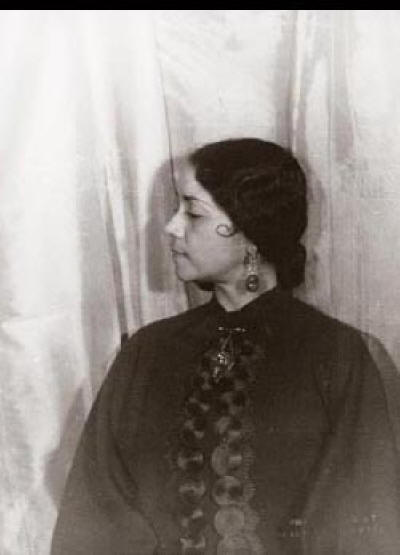

Queer Places:
1910 Vermont Ave NW, Washington, DC 20001
 Lillian
Evanti (August 12, 1890 – December 6, 1967), was an African-American opera
singer. Annie Lillian Evans, who would later become the famed classical singer
Lillian Evanti, was by many accounts the first African American to sing grand
opera professionally anywhere in the world.
Lillian
Evanti (August 12, 1890 – December 6, 1967), was an African-American opera
singer. Annie Lillian Evans, who would later become the famed classical singer
Lillian Evanti, was by many accounts the first African American to sing grand
opera professionally anywhere in the world.
She was born in Washington, D.C., and graduated from Armstrong Manual Training School,[1] where her father, W. Bruce Evans, was the first principal. Her paternal grandfather, Henry Evans was born in North Carolina as a free black man and later moved to Oberlin, Ohio where he helped with the Underground Railroad. Evanti's maternal grandfather John H. Brooks was elected to the House of Delegates in 1874 and defeated Frederick Douglas Jr. Although gifted in music, in 1908 Lillian entered Miner Teachers College (now University of the District of Columbia) for the education of black elementary school teachers. In her time there she met Georgia Douglas Johnson, a future poet and literary figure that Evanti would later consult with in writing songs. She graduated from Howard University in with a bachelor's degree in music.
Evanti married one of her professors, Roy W. Tibbs. At the suggestion of poet and editor Jessie Fauset, she combined Evans and Tibbs to form the more elegant “Evanti,” the name she would use professionally thereafter.
In 1925, Evanti moved to France in hopes of breaking into the European opera scene. During the next few years she performed with the Nice and Paris opera companies throughout Europe. She remained in France until the outbreak of World War II, at which time she returned to the United States. She was well received by audiences in the United States, though she periodically faced racism in the opera community. In one instance, the director of the Metropolitan Opera invited Evanti to audition, but he was unable to convince racist board members to hire an African-American singer.
Evanti was one of the founders of the National Negro Opera Company, and one of its most popular performers. When she sang La Traviata with the company in New York, the interest was so great that additional shows had to be arranged to accommodate the demand for tickets. For this occasion, Evanti translated the opera, which she had performed many times in French and Italian, into English. When the company took the show to Evanti’s hometown, her interpretation of Violetta was highly praised: “She is a coloratura whose vocal gifts and attainments include all the resources of the lyric soprano. Her interpretation was, in consequence, both brilliant and sympathetic.”
Evanti, who spoke (and sang) five languages, was a particularly versatile singer. She was known for her dynamic performances and her commanding presence on stage. Some time before African-American singers such as Leontyne Price and Adele Addison began to appear regularly in American operas, Lillian Evanti struggled to realize her tremendous potential as a performer in spite of the racism embedded in the opera world of her day.
They lived at 1910 Vermont Avenue in the Shaw Neighborhood of Northwest, Washington, D.C., which is now known as the Evans-Tibbs House and is listed in the National Register of Historic Places. Her grandson was Thurlow Evans Tibbs, Jr.
My published books: